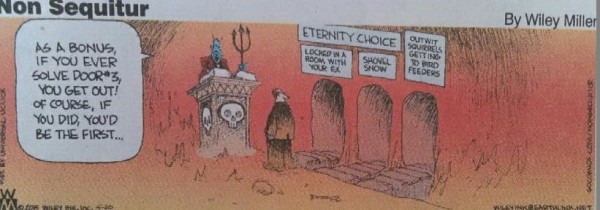
[This comic strip appeared in the May 20, 2015 edition of the Pittsburgh Post-Gazette]
Let’s use a comic strip to get serious about the concept of eternal Hell. “Non Sequitur” is a cartoon, and it is meant to be amusing. As a bird lover, I surely realize the frustration of the near impossibility of outwitting squirrels that are getting into bird feeders! However, as a believer in God and His perfect Word, I take most seriously the issue of eternal destiny. I am asking that you allow us to use this comic strip as a springboard to a deep discussion – one that has everything to do with our souls.
Please read and observe the cartoon carefully, and then ask yourself the question, “What does this comic teach about Hell that is actually incorrect information?” People take much of what they know about Hell for granted. But Hell is an issue of utmost importance. Should we not think it through?
Let’s review a few things about these funnies that may mislead us in regard to eternal damnation.
1) The devil is not in charge of Hell.
Although the picture of Satan standing behind the podium with his pitchfork in hand makes us think otherwise, it is detrimental to our understanding of God to believe that the devil could possibly be in charge of Hell. God is the Creator of all things. Specifically, Colossians 1: 16 (ESV) declares, “For by him all things were created, in heaven and on earth, visible and invisible, whether thrones or dominions or rulers or authorities – all things were created through him and for him.” All powers – those we can see and those we cannot see – were created by God. Satan is a fallen angel. He is a created being, albeit corrupted, but a created being nonetheless. Satan may have more power than a human does, but Satan has no power compared to the infinite strength of the Lord who made everything that exists out of absolutely nothing!
God and Satan are not equal opposites. God is all-powerful, and the devil is ultimately under His control. Similarly, Hell is under God’s control. In fact, Hell was a place originally prepared for the punishment of Satan and his angels! Jesus announced in Matthew 25:41 (ESV), “Depart from me, you cursed, into the eternal fire prepared for the devil and his angels.” The Holy Spirit tells us through the Apostle John in Revelation 20:9-10 (ESV), “And they marched up over the broad plain of the earth and surrounded the camp of the saints and the beloved city, but fire came down from heaven and consumed them, and the devil who had deceived them was thrown into the lake of fire and sulfur where the beast and the false prophet were, and they will be tormented day and night forever and ever.” As you can clearly see from God’s Word, Hell is a place of punishment for Satan and all who follow him. Rather than being in charge of what happens in Hell, the devil will be perpetually afflicted there.
Another solemn reminder given by Jesus Christ about God’s sovereignty versus the devil’s temporary power is found in Matthew 10:28 (ESV). In preparing His disciples for the impending persecution and martyrdom they would face, Jesus warned, “And do not fear those who kill the body but cannot kill the soul. Rather fear him who can destroy both soul and body in hell.” You see here that there are two beings with power, but only One has infinite and eternal power. Satan can temporarily (and under the watchful and sovereign eye of God, I should add) work to destroy bodies through persecution, but only God has power over the body and the soul! Our eternal hearts are in the charge of the Creator, not the devil. The devil will be dealing with his own punishment, not having oversight of souls. The only Person who is in control of your soul is the One Who created you.
2) You are not given a choice of your type of punishment in Hell.
Nowhere does the Bible tell us that people are allowed to choose what type of punishment or what degree of retribution that they will bear in Hell. These are the decisions of God, the perfect Judge. God has full knowledge of our existence, our thoughts, our intentions, our actions, our opportunities, and our rebellion. Hebrews 4:12-13 (ESV) makes clear, “For the word of God is living and active, sharper than any two-edged sword, piercing to the division of soul and of spirit, of joints and of marrow, and discerning the thoughts and intentions of the heart. And no creature is hidden from his sight, but all are naked and exposed to the eyes of him to whom we must give account.”
God also pronounces that His perfect Son, Jesus, is the One who will judge all humans. Jesus, the Son, is the One who died for us, and so He is the One to whom each person will answer for their rejection of His sacrifice. The Apostle Paul records in 2 Timothy 4:1 (ESV) “I charge you in the presence of God and of Christ Jesus, who is to judge the living and the dead …” Jesus Himself declares both the amazing promise of life for some and the horrific surety of judgment for others in John 5:26-29 (ESV), “For as the Father has life in himself, so he has granted the Son also to have life in himself. And he has given him authority to execute judgment, because he is the Son of Man. Do not marvel at this, for an hour is coming when all who are in the tombs will hear his voice and come out, those who have done good to the resurrection of life, and those who have done evil to the resurrection of judqment.”
After our physical bodies have died, God will still be alive! He exists forever; He is timeless. When our strength is gone, we fall into the hands of the living God of the universe. We will have nothing to say in reply to His perfect judgment of us. He will declare our destiny, and we will receive it. “It is a fearful thing to fall into the hands of the living God” (Hebrews 10:31, ESV). It behooves us to pray to God now, to read His Word now, and to trust in the death and resurrection of Jesus Christ now.
3) The horror of Hell is nothing to make light of.
While the comic strip jokes of two eternal choices, “being locked in a room with your ex” or “shoveling snow,” the reality of eternal damnation boasts no such choices. These would indeed be coveted outcomes compared to actual separation from every hint of God’s grace, goodness, and hope. In fact, Jesus uses a hyperbole to give us at least a hint at how tortuous Hell will be. In Mark 9:43-48 (ESV), Jesus proclaims, “And if your hand causes you to sin, cut it off. It is better for you to enter life crippled than with two hands to go to hell, to the unquenchable fire. And if your foot causes you to sin, cut it off. It is better for you to enter life lame than with two feet to be thrown into hell. And if your eye causes you to sin, tear it out. It is better for you to enter the kingdom of God with one eye than with two eyes to be thrown into hell, where their worm does not die and the fire is not quenched.” Our Lord is clearly trying to get us to understand that loss of physical function and comfort here is nothing compared to the loss and agony of hell. God tells us in several places, including Matthew 25:30 (ESV), that Hell is a place where there will be “weeping and gnashing of teeth.” In other words, people will be in a state of perpetual, painful regret.
As to whether the fire of Hell is literal or figurative, I appeal to both the Bible and our God-given logic. We humans were made as physical and emotional/spiritual. Our spirit is housed in a body. Our body needs our spirit to be who we are. God made us this way. The reality of Heaven includes a new and resurrected body (see Philippians 3:20-21 and all of 1 Corinthians 15). In the same way, the reality of Hell includes a resurrected body. Sadly though, the body of those condemned to Hell by God is a body that is resurrected for judgment (recall John 5:29). Our complete existence in God’s scheme of things is an existence of body and spirit. We can expect that Hell will be a place of both intense regret and guilt, but also a place of physical pain. Even in this life, our guilt and sadness can lead to physical symptoms. Imagine this multiplied to an infinite degree – with absolutely no hope of change.
4) There is no way out of Hell except for Jesus.
Solving the conundrum of door #3 cannot get you out of Hell, no matter what the cartoon implies. In the same way, your own best efforts in this life cannot get you out of Hell, no matter how much our culture or our human nature wants it to be so. Hell is a rejection of the God of the Bible. Hell is a refusal to recognize and/or deal with our own sinfulness. Hell is trust in ourselves instead of our Creator. Hell is a rejection of truth.
The surest thing in the universe (and outside the universe!) is God. What He says of our situation is the truth.
He says that we are sinners by nature – turned against Him. In fact, God is careful to give us the damning diagnosis in order to declare the cure. He says in Romans 3:10-18 (ESV), “None is righteous, no, not one; no one understands; no one seeks for God. All have turned aside; together they have become worthless; no one does good, not even one. Their throat is an open grave; they use their tongues to deceive. The venom of asps is under their lips. Their mouth is full of curses and bitterness. Their feet are swift to shed blood; in their paths are ruin and misery, and the way of peace they have not known. There is no fear of God before their eyes.” Wow. This is an accurate description of both humanity collectively and each individual person. We are wicked inside, no matter how much we try to sugar coat things on the surface. I know my self-centered and nasty ways. I know my complaining and bitter attitude. I know my tendency to bring ruin and misery to people and situations. I know that I have no peace of my own.
Here is the good news. God brings righteousness to us as a gift. (Righteousness is a fancy word meaning “right functioning” or “the way things ought to be in God’s eyes.”) How does He bring this rightness to us? He does so by His Son, Jesus Christ. All of the Old Testament (the Law and the Prophets) points to Him, and all of the New Testament reveals Him. When we choose to stake our lives on Jesus Christ, we gain the righteousness of God as a gift. Here the words of Romans 3:21-24 (ESV), “But now the righteousness of God has been manifested apart from the law, although the Law and the Prophets bear witness to it – the righteousness of God through faith in Jesus Christ for all who believe. For there is no distinction: for all have sinned and fall short of the glory of God, and are justified by his grace as a gift, through the redemption that is in Christ Jesus.”
Jesus declared Himself to be “the Way” (John 14:6). He is the Way to God and, thereby, the Way to avoid Hell. To be near to God is to be far from Hell, because Hell is a place of torment where people get their ultimate wish of being away from the God Who clearly revealed Himself in the Bible. If people want to be separated from God, they will be. Sin will stand forever between them and God. Hell is the culmination of rebellion against God and the desire to be our own savior. God dignifies the person who says, “I don’t want You or Your Way,” by giving to them eternal separation from Him. This separation will be Hell.
Jesus, however, is the Way to God. Jesus died on the Cross to pay for our sin, and He rose from the grave to empower us to live in relationship with God.
5) Satan would like you to believe misconceptions about Hell. God wants you to know the Truth.
Please do not allow comics, fiction, or false belief systems to skew your thinking about the very real truth of Hell. The devil is hoping you will be confused and accepting of lies and half-truths. He is counting on the fact that you will not take time to investigate what God actually says about eternity. He is hoping you will just believe culture’s portrayal of Heaven and Hell.
God wants you to know the Truth – that is Truth with a capital “T” – and His name is Jesus.
By Shelli S. Prindle




